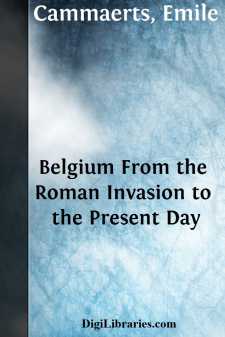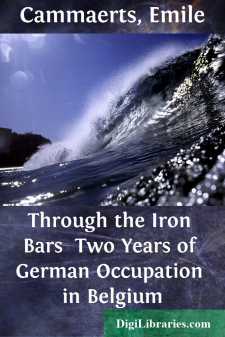Categories
- Antiques & Collectibles 13
- Architecture 36
- Art 48
- Bibles 22
- Biography & Autobiography 813
- Body, Mind & Spirit 142
- Business & Economics 28
- Children's Books 15
- Children's Fiction 12
- Computers 4
- Cooking 94
- Crafts & Hobbies 4
- Drama 346
- Education 46
- Family & Relationships 57
- Fiction 11828
- Games 19
- Gardening 17
- Health & Fitness 34
- History 1377
- House & Home 1
- Humor 147
- Juvenile Fiction 1873
- Juvenile Nonfiction 202
- Language Arts & Disciplines 88
- Law 16
- Literary Collections 686
- Literary Criticism 179
- Mathematics 13
- Medical 41
- Music 40
- Nature 179
- Non-Classifiable 1768
- Performing Arts 7
- Periodicals 1453
- Philosophy 64
- Photography 2
- Poetry 896
- Political Science 203
- Psychology 42
- Reference 154
- Religion 513
- Science 126
- Self-Help 84
- Social Science 81
- Sports & Recreation 34
- Study Aids 3
- Technology & Engineering 59
- Transportation 23
- Travel 463
- True Crime 29
Belgium From the Roman Invasion to the Present Day
by: Emile Cammaerts
Description:
Excerpt
INTRODUCTION
The history of the Belgian nation is little known in England. This ignorance, or rather this neglect, may seem strange if we consider the frequent relations which existed between the two countries from the early Middle Ages. It is, however, easy enough to explain, and even to justify. The general idea has been for a long time that the existence of Belgium, as a nation, dated from its independence, and that previous to 1830 such a thing as Belgian history did not even exist. All through feudal times we are aware of the existence of the County of Flanders, of the Duchy of Brabant, and of many other principalities, but, in no official act, does the term "Belgique" occur. Even after the unification of the fifteenth century, when the country came under the rule of the Dukes of Burgundy, the notion of a distinct nationality, such as the French or the British, remains hidden to the superficial student, the Netherlands forming merely a part of the rich possessions of the most powerful vassals of France. Through modern times the Belgian provinces, "les provinces belgiques" as they were called in the eighteenth century, pass under the rule of the kings of Spain, of the emperors of Austria and of the French Republic, to be finally merged, after the fall of Napoleon, into the Kingdom of the Netherlands. The word "Belgium," as a noun, is only found in a few books; "belgique" is a mere adjective applied to the southern portion of the Netherlands.
It must be admitted that the Belgian official historians of the old school did very little to dispel this wrong impression. In their patriotic zeal they endeavoured to picture Belgium as struggling valiantly all the time against foreign oppression. They laid great stress on Cæsar's words: "Of all the Gauls the Belgians are the bravest," and pictured the popular risings of the fourteenth and fifteenth centuries in the same light as the 1830 revolution. If we are to believe them, the Belgian people must have been conscious from their origin of their unity. They considered national princes, such as the Burgundian Dukes, in the same light as Philip II or the Austrian Emperors, and, instead of clearing the air, added to the confusion. Their interpretation of history according to the principles of national liberty of the Romantic period could not be taken seriously, and the idea prevailed that, if the Belgian nation was not merely a creation of European diplomacy, its existence could only be confirmed by the future, and rested on but frail foundations in the past.
This idea was strengthened by the knowledge that the country possessed neither strong natural frontiers, like Great Britain, France, Italy or Spain, nor the bond created by unity of language like Germany. Other European countries, it is true, like Holland or Poland, did not constitute strong geographical units and lacked definite boundaries but their people talked at least the same idiom and belonged, as far as the word may be used in a broad sense, to the same race. Others, like Switzerland, were divided between various languages, but possessed geographical unity. Belgium could not claim any of these distinctive features. Her boundaries remained widely open in all directions. From the cultivated plains of Flanders to the wild hills of the Ardennes she offered the greatest variety of physical aspects. What is more, her people were nearly equally divided, by a line running from the south of Ypres to the north of Liége, between two different languages, two different races. According to recognized standards, the very existence of the Belgian nation was a paradox, and though the history of mankind presents many similar contrasts between the hasty conclusions of the untrained mind and the tangible reality of facts, these cannot be recognized at first, and require a deeper knowledge of the past than that which can be provided by the study of warlike conflicts and political changes.
It was therefore left to the modern school of Belgian historians, and more especially to Professor Pirenne, of Ghent, to place the study of the origin of the Belgian nation in its right perspective and to show that, in spite of diversity of race and language, lack of natural boundaries and centuries of foreign domination, Belgian unity was based on deep-rooted traditions and possessed strong characteristics in every department of human activity which could be recognized from the early Middle Ages to the modern period....



